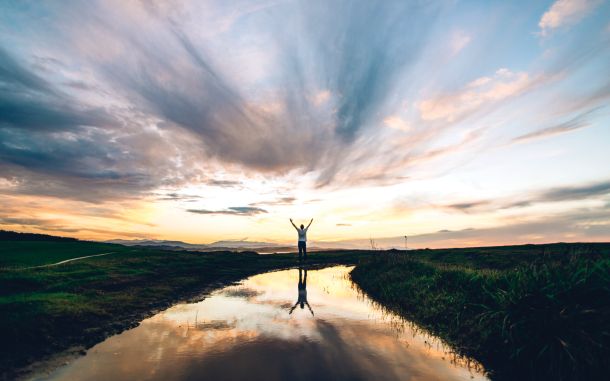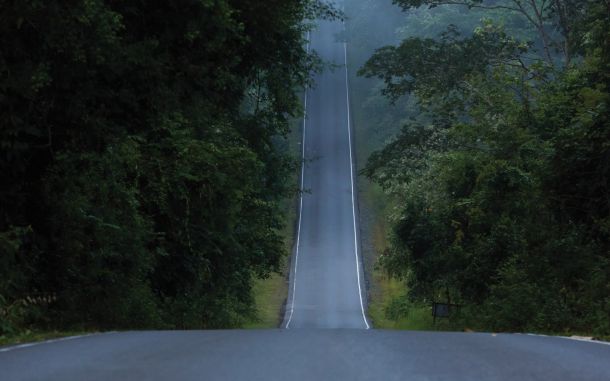We Began as Strangers

“Quick, the cord’s wrapped around her neck. Twice!”
I remember my numb feet in the stirrups. I remember the nurses on either side of me. I remember seeing my baby’s little purple head in the mirror, cone-shaped and strange. The doctor’s hand whirred around it in two circles, concise and quick. But I felt nothing.
“One more push, this is the biggest push!”
Two and a half hours into pushing, and I still don’t know how to push, I thought frustratedly. I tried as best as I could, my teeth crushing each other with determined force, my hands in knotted fists by my ribs. Out! She’s out!
Relief swirled through my exhausted, stretched body. There she was, in their hands, in the mirror. Then on my chest.
My daughter. Katie.
Her pale purple fingers were the first things I could see clearly. They curled and uncurled against my skin, unsure, new. A wet cry joined my panting breaths.
I was always told that a special part of your heart would open up when you held your child for the first time. I had imagined it so many times throughout my pregnancy. I knew just how it would be; they would hand her to me, and it would feel like sparkling, golden honey had flooded my soul as my eyes drank in every delicate feature of her face.
But here I was, staring at her tiny fingers in shock and confusion instead. This isn’t my baby. Where is the one that lived and hiccuped and kicked in my womb? Surely this isn’t her. It can’t be. There are no sparkles in my heart. Just this strange child on my chest. Purple, alien-esque. And those fingers. Purple. Unfamiliar.
Then she started to slip off of me, and my arms were shaking so badly from the epidural that I couldn’t grasp her well. Her naked rump landed on the bed and I apologized, sorry, sorry! I don’t know what I’m doing. Where is my real baby, where is she?
I glanced desperately at my husband. He was sitting slightly behind me to my right. His face was pale, his gaze distant. He had seen the basins of blood the nurses were taking away. The doctor offered him the scissors to cut the umbilical cord. “No, no,” he said. He had already told the doctor he didn’t want to cut it, but she wanted to give him the chance. “No.” His hands covered his nose in a tent and he slammed his eyes shut, blocking out the images.
So the doctor offered me the scissors. I would’ve laughed if I had the energy; my fitfully shaking arms could barely hold my newborn, much less a sharp object. “Please, cut it yourself,” I muttered, exhausted. “I can’t.”
I can’t. How could I muster the strength to care for this child? How could I even love this child when she felt like a total stranger to me, her own mother? Everything was wrong, so wrong… I closed my eyes and exhaled slowly. They had all lied. They lied about everything and I feel worlds away from my own baby, even my own husband. I felt panic start to prickle in my stomach. Perhaps I was in shock, I’ll never know. I handed the baby girl to a nurse, feeling dazed and alarmed at the emptiness in my chest.
I can’t do this.
The words would drift through my mind many times throughout the next few weeks like a cold, gray breeze. They would chill me to the core, and I’d wrap my fuzzy purple robe tighter around myself to stave it off. "Being a mother is the most natural thing in the world,” they had told me. Oh, but it feels so unnatural! Please help me, God! The tears would squeeze out from my clenched eyelids, falling gently on my baby’s swaddle in the dark. I’d try one more time to get Katie to latch for breastfeeding, only to have my toes curl in pain against the flattened rug. I can’t. Not one more time can I do this.
It was then just past two in the morning. I got up twice more that night to nurse her. I gasped in pain, curled my toes, and rocked back and forth to soothe us both. Back and forth. Back and forth. Please God, help me. Take my pain away. Give me strength. Help my baby. Back and forth.
They called them the “baby blues.” I thought of them as the “baby grays,” because the days were gray and the nights were darker gray. I felt as though I were feeling my way through a heavy fog; it filled my lungs with its oppressive weight and made it hard to breathe at times. But I kept feeling and forging on, one day at a time, one hour at a time. There was no other choice. I felt duty-bound to my daughter.
Yet mercifully—out of that horrible, stark grayness—glimmers of light began to beam. Little moments, like tiny fireflies, glowed gently among the struggle-filled weeks.
I held Katie against my shoulder. Her panting was pleasant against my neck, warm and rapid. Her eyelids flickered. Baby dreams. Downy, blond hair tickled my cheek and her tiny hand jerked in a startled reflex. I was touched to see her smooth skin, her plump pink cheeks, her rosebud lips, and know that they were created inside of me.
Then there was my own body. The skin on my belly draped like a loose curtain. My under-eyes were sunken and purplish. Angry stretch marks streaked across a large portion of my body. Sometimes I would see myself in the mirror and think, I’m only twenty-two years old. Should I have waited? What have I given up?
Then I would see her, my beautiful child sleeping blissfully in her crib. I had exchanged my smooth skin for hers. I gave up rest and ease so that she could enjoy both of them. I sacrificed my body’s youthful form to stretch and bulge and itch and creak, all in the hope of granting Katie her chance at life.
During the lonely nighttime feedings, I would ponder how a daughter is not only created in her mother, but from her mother. And that sense of giving, that feeling of servanthood and sacrifice, became sacred to me. I felt as though I had wandered into a humbling sisterhood of billions of women, not really knowing what to expect. Did any of us understand what we were taking on when we felt that gentle stirring in our wombs? But here we were anyway. We were all trying. We were all grappling with this heavy and holy work of raising our children.
That invisible bond pulled me to other women: my mother, my sisters, my mother-in-law, my friends. Drawing from their experiences, their hardships, and their successes was like sipping a warm, soothing beverage for a sore throat. I wasn’t alone in this wrestle. We all had long days that had dissolved into evening tears. We laughed until our bellies ached from the funny stories our children provided. Our hearts had swollen at the sight of our precious children, smiling their crooked smiles and giggling their throaty giggles.
I learned that it might take a village to raise a child, but it also takes a village to raise the mother of that child. These women listened to me, they gave advice, they brought meals, they donated clothes, they babysat, and they mentored me. But their various examples were also crucial. I saw how these women hadn’t just accepted their roles; they had grown into them and flourished. I saw that I could do it, too.
As with any growth, though, it would take time. Like my daughter, I was in an unfamiliar infancy—trying to figure out how to gain control of myself, how to form a bond, how to communicate with another being that didn’t speak the same language. We really weren’t that different; I was merely further along on the same path. That perspective helped me develop patience through the exhausting nights and the drawn-out days. Each hour held another lesson. I kept trying to figure out what a specific cry meant, then how to coax a gummy grin out of Katie, and eventually how much pear purée she could comfortably stomach. She kept learning how to get my attention or tell me that she didn’t like having her hair washed. And so we grew and learned together.
My newborn mother-self slowly developed until I was metaphorically toddling along. After five months of having a baby, I finally felt like I had my feet under me. I was confident that I could care for Katie and meet her needs. But like any toddler, I had my stumbles. What do I do when she has a fever? How do I care for her eczema? Oh no, she whacked her head on the bookshelf, how could I have let this happen? Thankfully, my husband was there to assist and calm me in such moments of insecurity. We had made it this far, hadn’t we? We could continue to figure it out.
One of my biggest growing moments occurred when my husband was away for military training. I was at home with my eight-month-old, and the monster Hurricane Michael was bearing down on the Florida Panhandle. It was predicted to make landfall an hour east of our home. My husband and I hadn’t been able to communicate due to strict regulations, so I couldn’t update him on the potential danger I faced. I felt extremely alone and anxious as I debated whether to leave or stay.
Finally, I held my crying daughter in one arm and raced from room to room with my phone in the other hand, taking videos of our home and possessions in case we needed them for insurance purposes. My heart beat wildly as I threw clothes, formula, and other necessities into a suitcase. I grabbed our cardboard “Important Docs Box” and threw it in the trunk.
We were leaving. There was no time to keep debating about an evacuation. I prayed silently as I buckled Katie into her carseat. Please protect my home, Heavenly Father. Keep us safe on the roads.
I might have stayed if it were just me at the house. But with my child, it was different. I alone was in charge of her safety. The responsibility weighed heavily on my heart as we drove from our home to Baton Rouge. My husband would understand the cost of a hotel for a couple of nights.
I stopped at a gas station halfway to our destination. Again, I held my whimpering baby in one arm. With the other, I filled a paper cup with hot water from a coffee machine to warm Katie’s formula. I was so distracted that the scalding water overflowed onto my hand. I angrily dropped the cup and gritted my teeth, blowing on my burned skin to cool it down.
My startled baby had stopped crying and was staring at me in confusion. Oh, my precious girl. She has no idea why we’re here in a gas station, why I’m getting hot water, why we’re leaving our home. Looking into Katie’s concerned blue eyes, the burning sensation slowly lessened and I suddenly felt grateful. To spare her from worry or fear, I had taken the leap to evacuate. That thought filled me with peace. Sometimes the best antidote for fear is to simply make a decision and follow through, and I was proud that I had done that, even in my frazzled state.
The strength to make my decision came out of necessity. I couldn’t talk to my husband about our options. I had to weigh them myself and decide on a course of action in a short amount of time. The pressure helped streamline my thoughts and clear my vision. I didn’t realize my own ability until I was forced to look it square in the face and ask myself what I was willing to do to protect my child. So there I stood in a middle-of-nowhere gas station with a burned hand, a tear-stained baby on my hip, and a calmness in my heart. I felt as if I had grown three inches in the last few hours. While the process was nerve-wracking and soul-stretching, I could stand a little taller.
I refilled the cup—more carefully, this time—and warmed Katie’s bottle. We got back on the road fifteen minutes later and arrived safely in Baton Rouge. Our home ended up being safe, and my husband and I were able to talk about the situation a couple of days later. Things were good, and I was a more developed person because of the setbacks I had faced.
Now, my daughter is freshly two years old. A few days ago, she ran around our living room in delight, herding purple balloons into a huddled mass. “It’s been two whole years since the morning we held our newborn in that hospital room,” I stated, looking over at my husband. Katie squealed and tossed a balloon in the air between us.
My husband shook his head and tented his hands over his nose, the same way he had in the hospital. “Ugh,” he muttered. Then he lifted his head. “It’s so much better now. So much better.” After a small pause, he added, “I do love her. I do love my little girl.”
I smiled in agreement. “I love her, too.” I got on my hands and knees and chased Katie through the balloons, and her joyous giggles filled the room.
There was that sparkling honey again. That same love that I had felt many times in the last two years flooded my chest, warm and soothing and sweet. I gazed adoringly at my beautiful daughter in a way that I used to think wasn’t possible. I had changed. I had been refined. I had grown into motherhood. And in that agonizing, hand-reaching, soul-rending, prayer-filled growth, I had found the most beautiful love for my Katie.
I have experienced many external and internal challenges in my life. But none of them amount to the transformation I’ve had in learning how to love and serve a little being that is my very own. To love is to serve, and to serve is to sacrifice. To sacrifice pride, comfort, ease, sleep, time, peace, and your very body is a sacrifice that all mothers make, and I’m now bearing that staggering and magnificent weight myself. The weight strengthens me each day, and I am able to press on stronger and more capable the next day—because I am a mother, and I love my child as only a mother can.









